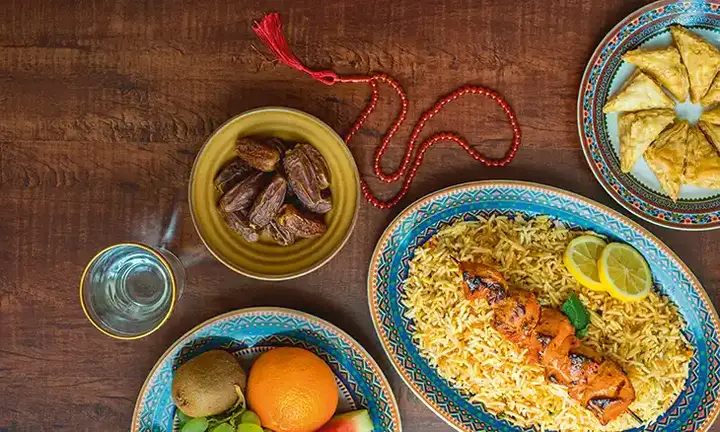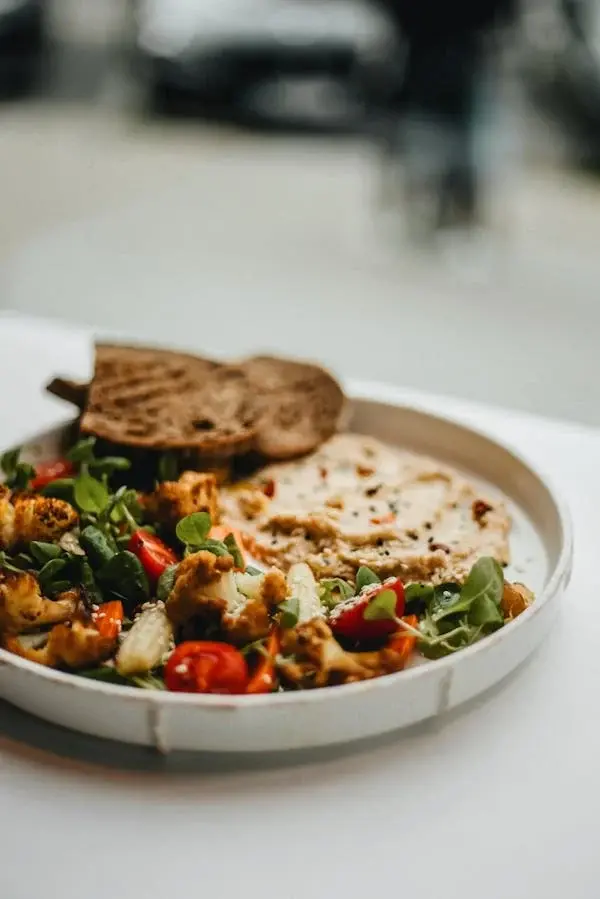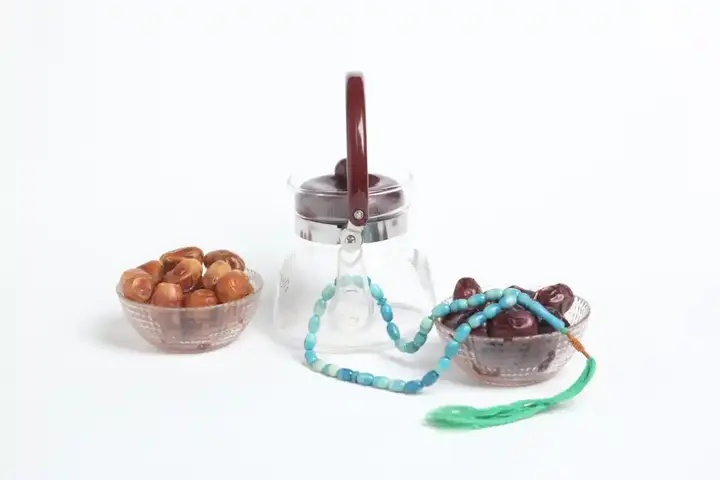Healthy fasting in Ramadan

Ramadan is the ninth month of the Islamic calendar, when observant Muslims fast strictly from dawn to sunset. Fasting and abstaining from food and drink during daylight hours are among the most important acts of worship in this holy month. Maintaining a balanced diet during this holy month is essential to keep the body active for prayer and other practices throughout the day.
Show key points
- Fasting during Ramadan, observed from dawn to sunset, is a core act of worship for Muslims and requires physical and spiritual preparation.
- Suhoor, the pre-dawn meal, should be light yet nutritious, with protein, healthy fats, and complex carbs to sustain energy throughout the fasting day.
- Breaking the fast with dates is a Sunnah and offers quick-release sugars along with fiber and nutrients, making it a healthy way to restore energy.
- ADVERTISEMENT
- Meals should follow the Healthy Plate model, with half veggies, a quarter complex carbs, and a quarter protein to ensure balanced nutrition and energy.
- Staying hydrated is essential during non-fasting hours, and consuming fluids such as water, soups, and electrolyte-enhanced drinks supports overall health.
- Frying and processed foods high in fat or sugar should be minimized, and mindful eating practices like portion control and slow chewing help avoid overeating.
- Special populations like pregnant women, people with chronic illness, or travelers should consult healthcare providers before fasting to ensure safety.
Suhoor tip: "Eat a light Suhoor every day."

Suhoor is a meal that Muslims eat before the Fajr call to prayer in Ramadan, and it is considered a desirable and beloved delegate to God, based on a saheeh hadith that says: "Be enchanted, for there is a blessing in Suhoor." Suhoor helps reduce the effect of fasting on the fasting person, and can be a snack that contains carbohydrates, protein and fat. Suhoor is preferably balanced and nutritious to keep the body active throughout the day.
Recommend
This is especially true for special groups such as the elderly, adolescents, pregnant women, nursing mothers as well as children.
Tip for breakfast: "Break the fast on dates."

A hadith of the Prophet says: "If one of you breaks his fast, let him break his fast on dates, and if he does not find it, let him break his fast on water, then this is purification, and this is the legitimacy of breaking the fast on dates."
Dates are a great source of fast activated sugar, which is what you want when you're fasting during the day. It also contains some fiber, and when paired with a protein source such as some nuts, it can prevent a sharp rise in blood sugar. Some options are nut butter, almond or walnut. Depending on the size of the dates, you should not eat 10 dates, but only one or two.
In general, fried and processed foods that are high in fat or sugar should be avoided. You can enjoy your meal and avoid overeating by eating slowly.
At breakfast, you need to control yourself and do not jump into your main meal. Take a few minutes to perform your prayers and then return to eat. Listen to your hunger and satiety signals and make sure for yourself that you are eating slowly, chewing and enjoying food.
Healthy meal preparation:

When you prepare your meal, make sure you're getting complex carbohydrates and carbohydrates rich in fiber, protein, and healthy fats. A great visual element to use is the Healthy Panel model, which can help you balance your nutrients, meet your energy needs and food groups.
Visualize your plate and divide it in half. Half of your plate should be non-starchy vegetables or salad, then a quarter of your plate should be of complex carbohydrates rich in fiber, such as quinoa or potatoes, and you can also put fruits here. The last quarter of your plate is dedicated to protein, i.e. chicken, beef and other meats.
When it comes to the dawn meal, you have to get enough protein to keep your body healthy. The reason we focus on protein and healthy fats is because they are slower to digest in the body, foods that will give you energy throughout the day. Examples include eggs, avocados, toast, oats, yogurt and pies stuffed with beans and eggs.
People love to eat rice, chicken, salad and soup for dinner. For breakfast, be sure to combine these types of foods with a healthy dish model. There are some foods you can eat without too much of them, such as sweetened drinks and fried foods. Many foods tend to be fried, so enjoy them in moderation. Make sure your other foods are balanced and more nutritionally dense.
A recent study found that fasting affects lipid levels and this leads to lower cholesterol, and fasting may reduce the concentration of inflammatory cytokines, for example IL-6, IL-1β, TNF-α and the number of white blood cells. High concentration of cytokines is known as a risk factor for cardiovascular disease, insulin resistance and cancers. So fasting can prevent heart attacks, strokes, and other diseases.
Starting fasting suddenly is a shock to your body. Instead, gradually limit your food and drink intake for several days or even weeks before your fast. Dr. Zayn warns, "Don't eat three full meals a day with snacks between meals, and then stop eating in a day." If your body is used to refueling on a regular basis, you may find it difficult to maintain energy levels while fasting.
You should keep your sugar intake low before heading to fasting:

You may feel satisfied or (full) after eating sweets at the moment, but when your blood sugar level drops after an hour or two, you are likely to feel hungry and weak, and feeling hungry may spoil your mood and can extend to your personal relationships.
Important tips for healthy fasting:

1. Stay hydrated:
It is preferable to drink enough water daily to maintain fluid balance in your body. Dehydration may affect overall health and lead to problems such as headaches and stress. Continue to drink water and other fluids, especially in the summer or while fasting in Ramadan.
2. Variety is the flavor of life:
Discover new things and enjoy diverse experiences. Traveling, learning, the arts, and interacting with different people can be ways to bring diversity to your life.
3. The size of your allocation is important:
When eating, try to be aware of the size of your portion. Eating the right amount of food helps maintain health and ideal weight. Stay away from overeating and avoid foods high in calories.
4. Keep moving:
Physical activity plays an important role in overall health. Try to exercise regularly, even if it's a simple walk. Movement helps improve physical fitness and relieve stress and anxiety.
In the end, enjoy life in its diversity and take care of your health and psychological well-being.
It is very important to make sure that your body is adequately hydrated during non-fasting hours. This could mean taking a bottle of water with you if you go out for night prayers. Tea, soups and high-water fruits, such as watermelon, all count towards your fluid intake.
It's not just about what you eat, but also about when and how you eat it:

Another great tip is to add electrolytes to the water. Electrolytes help your body absorb the water you drink and add more potassium, sodium, and vitamin C. Mix sugar-free electrolyte powder in water or make it yourself using coconut water, a pinch of salt and a pinch of orange juice.
Coffee can cause severe dehydration. Should people reduce coffee intake at Ramadan? If you drink coffee and then suddenly stop within a month Ramadan, you may experience some headaches, so doctors recommend people reduce their caffeine intake, although it depends on how much they are currently drinking. However, some people like caffeine and drink their coffee at Suhoor.
Let's explore some special conditions that may affect Ramadan fasting:

1. Pregnant:
o Pregnant women should consult a doctor before fasting.
If the pregnancy is healthy and there are no health problems, pregnant women can fast.
o Pregnant women should eat balanced meals and pay attention to nutrition.
2. People with chronic disease:
o Chronic patients should consult a doctor before fasting.
Fasting may be inappropriate for some conditions such as diabetes, heart disease, and high blood pressure.
o Patients should take medication and medical follow-up.
3. Children:
o Young children should not fast.
o Older children can try fasting gradually according to their ability.
4. Passengers:
o Travelers can postpone fasting and spend it later.
o Passengers must make up for the days they did not fast after returning.
5. People with acute illness:
o Terminally ill patients should avoid fasting.
o The priority is treatment and recovery.
In all cases, individuals should consult and take care of their health, as Ramadan is the month of mercy and blessing, and God knows the intentions and accepts the efforts made.
Salvation of the saying:

For a busy month of Ramadan, improve your nutrition, balance your meals with the healthy dish model, drink enough water and add electrolytes as needed. And enjoy the foods you eat.








